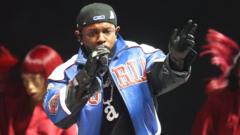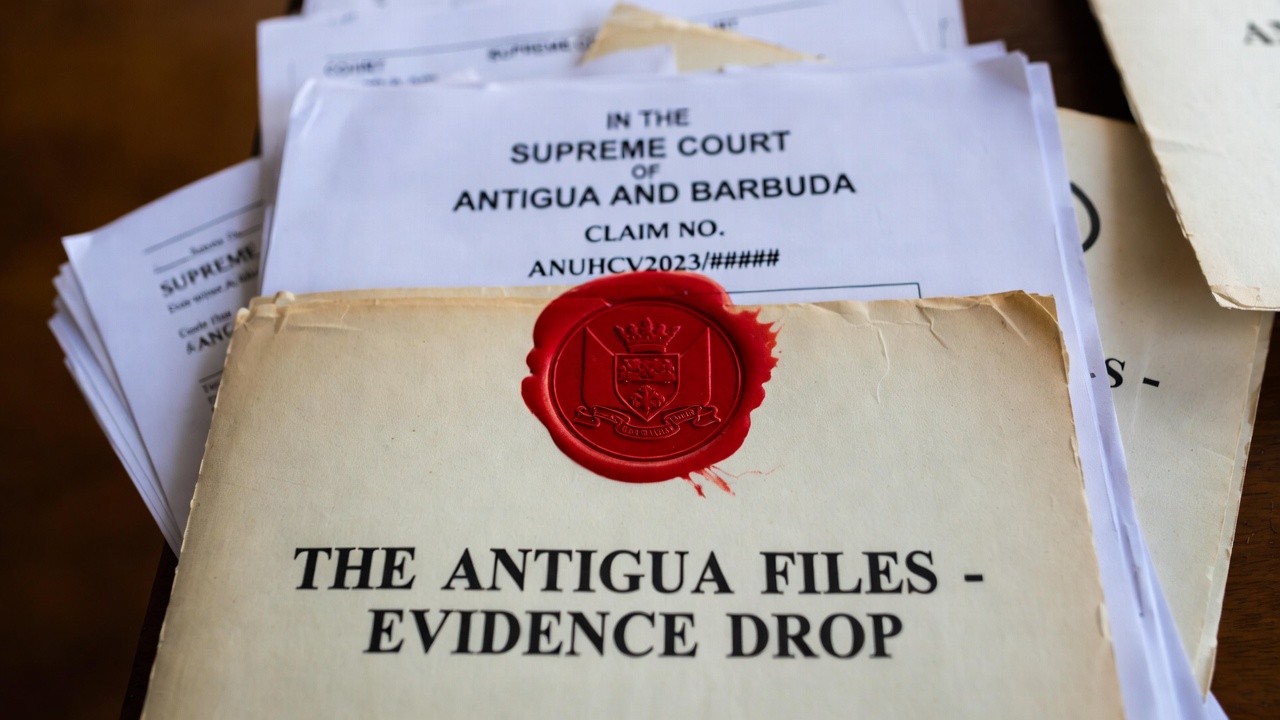Kendrick Lamar made history as the first rapper to headline the Super Bowl as a solo act, delivering a performance that was both electrifying and filled with strategic teases. Right from the start, Lamar alluded to the legal battle with Drake over the song "Not Like Us," which had drawn significant public attention due to its controversial lyrics. "I want to play their favourite song... but you know they love to sue," he quipped, capturing the audience's curiosity.
As the show progressed, Lamar playfully teased the crowd with indications that he would play the contentious hit. When he finally performed it, he self-censored the most explosive line, opting for measured references while still flaunting his boldness with clever wordplay. This fine line between defiance and discretion kept the audience engaged while showcasing Lamar's undeniable appeal, even amidst legal complications.
The atmosphere was further electrified by the surprise appearance of tennis superstar Serena Williams, who captivated the audience with a dance move called the Crip Walk as Lamar commanded the stage. The show's vibrancy was enhanced by engaging visuals featuring dancers, fireworks, and a towering performance space reminiscent of a giant noughts and crosses board—much in line with Lamar’s introspective lyrics juxtaposed with crowd-pleasing anthems.
Samuel L. Jackson brought a comedic flair to the night, taking on the role of emcee and blending humor with an underlying critique of Lamar's self-indulgent moments. Their playful banter added a spark to the concert, with the crowd responding positively to Lamar's collaborations, especially a mesmerising duet with SZA on "All The Stars."
Throughout his 13-minute set, Lamar showcased a career-spanning array of 11 songs—each distinct yet woven together by thematic threads of confidence, conflict, and commentary. Notably, the performance melded hits from the Pulitzer Prize-winning album DAMN with newer tracks, drawing a varied audience into its narrative.
Noteworthy was Lamar's directed omission of his civil rights anthem "Alright," a potential commentary on the NFL's recent decision to remove the phrase "end racism" from the stadium, reflecting a conscious choice to maintain a less controversial narrative.
The performance indeed culminated in an unexpected twist when a protester briefly disrupted the show by unfurling a flag before being subdued by security, underlining the ever-relevant political undertones of the performance.
In a night filled with celebrity appearances, the likes of Taylor Swift and Lady Gaga, the show's actual buzz was undeniably centered around Lamar—who emerged not just as a performer but an artist moving within the complex interplay of law, fame, and music.
The impactful moments of the set will surely resonate beyond the confines of the Super Bowl, maintaining Kendrick Lamar's status as a trailblazer in the music industry while inviting discussions on the evolving role of artists in a politically charged landscape.
As the show progressed, Lamar playfully teased the crowd with indications that he would play the contentious hit. When he finally performed it, he self-censored the most explosive line, opting for measured references while still flaunting his boldness with clever wordplay. This fine line between defiance and discretion kept the audience engaged while showcasing Lamar's undeniable appeal, even amidst legal complications.
The atmosphere was further electrified by the surprise appearance of tennis superstar Serena Williams, who captivated the audience with a dance move called the Crip Walk as Lamar commanded the stage. The show's vibrancy was enhanced by engaging visuals featuring dancers, fireworks, and a towering performance space reminiscent of a giant noughts and crosses board—much in line with Lamar’s introspective lyrics juxtaposed with crowd-pleasing anthems.
Samuel L. Jackson brought a comedic flair to the night, taking on the role of emcee and blending humor with an underlying critique of Lamar's self-indulgent moments. Their playful banter added a spark to the concert, with the crowd responding positively to Lamar's collaborations, especially a mesmerising duet with SZA on "All The Stars."
Throughout his 13-minute set, Lamar showcased a career-spanning array of 11 songs—each distinct yet woven together by thematic threads of confidence, conflict, and commentary. Notably, the performance melded hits from the Pulitzer Prize-winning album DAMN with newer tracks, drawing a varied audience into its narrative.
Noteworthy was Lamar's directed omission of his civil rights anthem "Alright," a potential commentary on the NFL's recent decision to remove the phrase "end racism" from the stadium, reflecting a conscious choice to maintain a less controversial narrative.
The performance indeed culminated in an unexpected twist when a protester briefly disrupted the show by unfurling a flag before being subdued by security, underlining the ever-relevant political undertones of the performance.
In a night filled with celebrity appearances, the likes of Taylor Swift and Lady Gaga, the show's actual buzz was undeniably centered around Lamar—who emerged not just as a performer but an artist moving within the complex interplay of law, fame, and music.
The impactful moments of the set will surely resonate beyond the confines of the Super Bowl, maintaining Kendrick Lamar's status as a trailblazer in the music industry while inviting discussions on the evolving role of artists in a politically charged landscape.






















